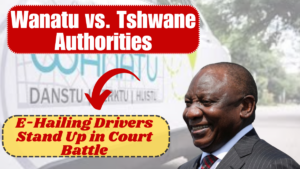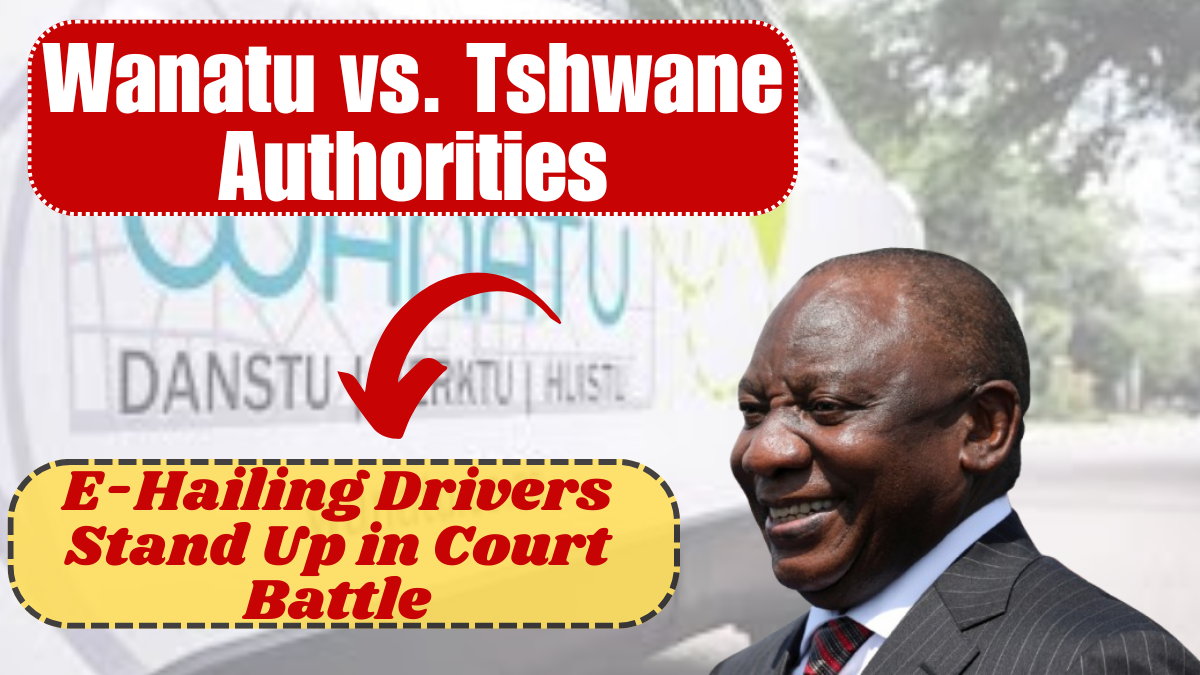A major showdown is unfolding in South Africa’s ride-hailing industry. Wanatu, a new e-hailing platform, has suspended operations and taken legal action against the Tshwane Metro Police Department (TMPD) after two of its vehicles were impounded.
Calling the move “unfair and unlawful,” Wanatu’s bold legal challenge has gained national attention, particularly among thousands of drivers battling a broken permit system.

Who Is Wanatu and Why Is It Different
Launched in 2024, Wanatu is a local e-hailing service known for one unique feature — all its drivers speak Afrikaans. Its name, derived from the Afrikaans word “waarnatoe” (meaning “where to”), symbolizes its cultural niche in the industry.
But now, instead of focusing on expansion, Wanatu is in the spotlight for leading a legal movement to protect drivers facing increasingly strict enforcement from Tshwane officials.
Why Are E-Hailing Drivers in Crisis
The trouble began with the amended National Roads Traffic Act, which introduced new road carrier permits specifically for e-hailing drivers in mid-2024. However, implementation has been disastrous:
-
Over 20,000 drivers are still waiting for permit approvals
-
New applications have been suspended since November 2023
-
Most drivers are stuck in limbo — they can’t work legally, yet they haven’t received permits
The result is a system where drivers are punished despite complying with the rules.
Targeted Enforcement by Tshwane Metro Police
TMPD has established regular checkpoints around Pretoria, particularly in high-demand areas, to catch e-hailing drivers operating without permits.
Common complaints from drivers include:
-
Having cars impounded despite proof of permit application
-
Being fined or charged thousands of rands to retrieve vehicles
-
Alleged corruption, with drivers claiming to be asked for bribes ranging from R3,000 to R6,000
-
No alternative means to legally work while awaiting permits
These actions have led to rising tension between the authorities and the e-hailing community.
What Is Wanatu’s Legal Argument
Wanatu formally filed a legal challenge against TMPD on 6 February 2025, arguing that their vehicles were unlawfully impounded. The platform also invited other affected drivers to join the case — and the response was immediate.
Within just 48 hours:
-
Over 200 drivers from Uber, Bolt, and InDrive expressed interest in joining
-
Several organizations voiced their support, including:
-
The Lions, a driver advocacy non-profit
-
Tshwane West E-Hailing Association, soon to be renamed Mzansi Independent E-Hailing Partners
-
Wanatu believes this case could be a game-changer, potentially forcing the government to rethink how permits and enforcement are handled across the industry.
How Are Competitors Responding
While Wanatu has paused operations in protest, other platforms like Uber, Bolt, and InDrive continue to operate — though drivers report facing the same challenges.
Wanatu’s vehicles, due to their unique branding and Afrikaans-only service, are more recognizable — and possibly more targeted — making the risk of impoundment much higher.
Has This Happened Before in South Africa
Yes. In 2022, a similar issue exploded in Cape Town, where over 2,000 e-hailing vehicles were impounded due to permit delays.
The city had frozen new applications to protect the metered taxi industry, leaving drivers stranded. The similarities between the Cape Town and Tshwane situations highlight a national issue with how ride-hailing is regulated.
What’s Next for Wanatu and the Industry
As the legal proceedings move forward, several possible outcomes are on the horizon:
-
A ruling that redefines enforcement protocols for e-hailing permits
-
Government pressure to resolve the backlog in permit processing
-
Industry-wide reform that creates consistent, transparent licensing policies
Wanatu has become more than a platform — it’s now a symbol of resistance for thousands of drivers seeking fairness and protection under the law.
FAQs
What is Wanatu and when did it launch?
Wanatu is an Afrikaans-focused e-hailing service launched in 2024. The name means “where to?” in Afrikaans, and all its drivers are fluent in the language.
Why were Wanatu vehicles impounded?
Tshwane Metro Police impounded two Wanatu vehicles for allegedly operating without permits. The company argues that the impoundments were unfair since permit processing has been delayed for months.
How many e-hailing drivers are affected by the permit crisis?
More than 20,000 drivers across South Africa are affected. Permit applications have been frozen since November 2023, causing widespread legal and financial issues.
What is the National Roads Traffic Act amendment?
The 2024 amendment introduced road carrier permits for e-hailing drivers. While well-intended, the rollout has been slow, leaving most drivers without legal documentation.
What support does Wanatu have in this legal battle?
Supporters include hundreds of drivers from other platforms, advocacy groups like The Lions, and the Tshwane West E-Hailing Association.
Are Bolt, Uber, and InDrive involved in the lawsuit?
No, they have not joined the lawsuit, but many of their drivers have shown interest in supporting Wanatu’s legal challenge.
Can e-hailing drivers still apply for new permits?
No. As of March 2025, new applications remain suspended, and existing applications are still stuck in a backlog.
Click here to know more.
Aanchal is a passionate writer with a keen interest in storytelling, content creation, and creative expression. She enjoys exploring diverse topics and crafting engaging narratives that captivate readers.

